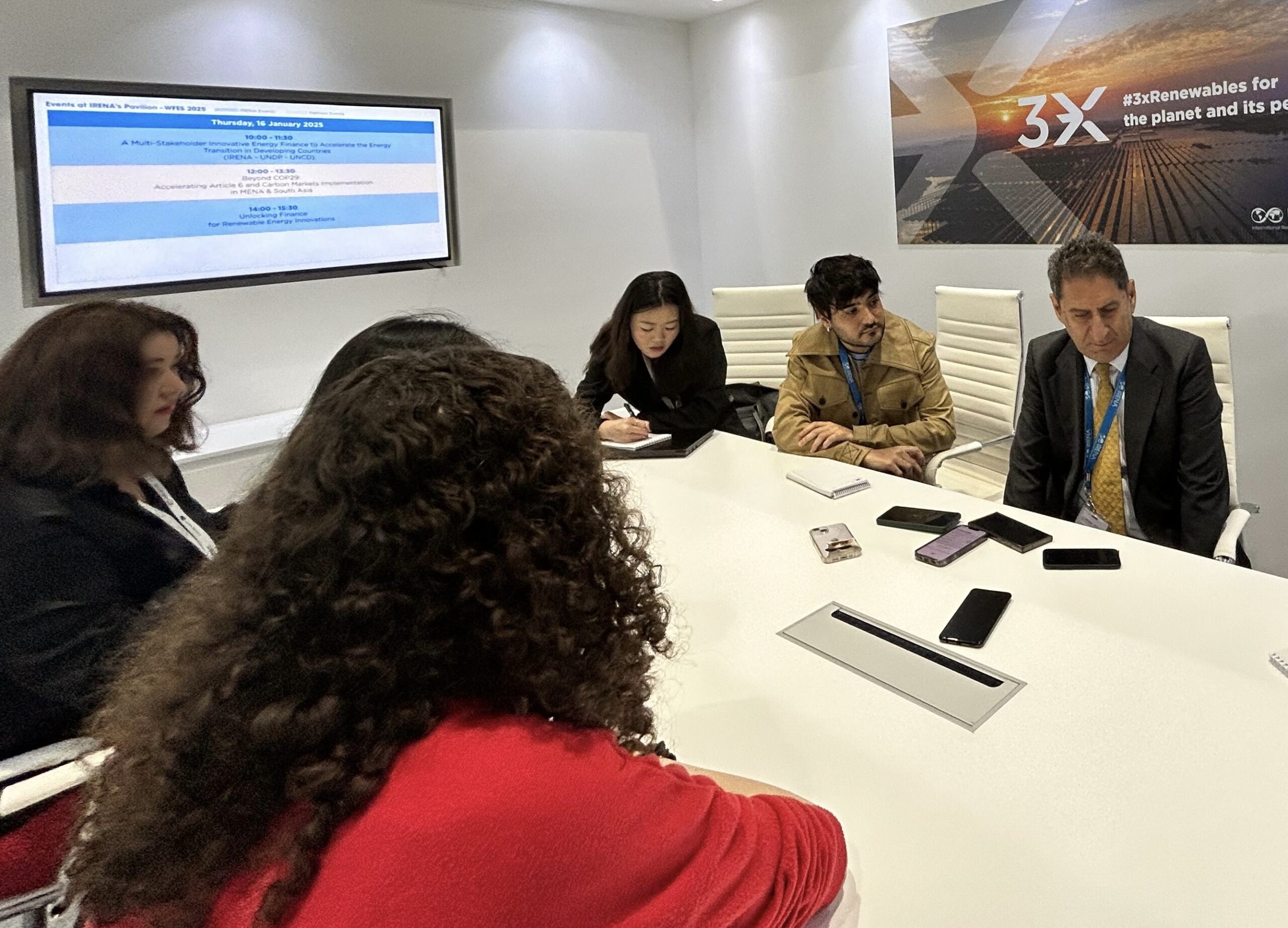ABU DHABI — In an interview with The Astana Times during Abu Dhabi Sustainability Week (ADSW) 2025 in the United Arab Emirates (UAE), Francesco La Camera, director general of the International Renewable Energy Agency (IRENA), emphasized the critical role of interconnectivity in advancing renewable energy development in Central Asia.

La Camera with a group of journalist on the sidelines of ADSW 2025 on Jan. 16 Photo credit: IRENA
He highlighted the region’s immense potential to reduce electricity costs, produce green hydrogen, and eventually export energy to Europe.
Central Asia’s renewable energy potential
“Interconnectivity is key. We are organizing an investment forum for Central Asia during Energy Week in Baku this June. Strengthening connections within the region and linking to the European market are essential steps forward,” said La Camera.

La Camera, IRENA Director General emphasized the critical role of interconnectivity in advancing renewable energy development in Central Asia. Photo credit: IRENA
He noted that countries like Azerbaijan are making strides to enhance energy infrastructure.
“Azerbaijan has committed to doubling its pipeline capacity to Europe. Agreements like the one recently signed between Albania and Italy—facilitated by the UAE’s TAQA utility company—demonstrate how infrastructure is evolving to enable cross-border energy flows,” he said.
La Camera explained that linking Central Asia’s renewable energy systems to Europe could leverage existing infrastructure projects.
“Infrastructure is a major focus because it drives investment and reduces electricity costs for the region. Central Asia has tremendous potential—it’s a region where renewable energy can flourish and even be exported to Europe,” he added.
According to La Camera, Central Asia offers vast, untapped opportunities for renewable energy development, particularly in solar and hydrogen production.
“The region has an abundance of land to install solar plants—unlike countries like Italy, where space is limited. Central Asia has the potential to produce green hydrogen and embrace a new energy system,” said La Camera.
He reiterated that the global energy system is inevitably shifting toward renewables, with green hydrogen and sustainable biomass playing complementary roles.
“We are transitioning to a system dominated by renewables. It’s vital for countries and markets to recognize this shift, adapt, and maximize the benefits of this transformation,” he stated.
According to La Camera, Central Asia is beginning to understand how renewables can lead to lower energy prices and energy security.
China’s leadership in renewable energy
During the interview, La Camera also acknowledged China’s leadership in renewable energy and storage technologies. He pointed to China’s significant investments in new energy systems and its progress in addressing environmental challenges.
“Fifteen years ago, Beijing was covered in smog—you couldn’t even see the sun. China recognized the urgency to change and shifted decisively toward renewable energy. Today, it leads the world in technologies like battery storage, electric vehicles, and circular economy practices,” he said.
China’s advances in energy storage, such as developing ultra-fast charging technology for electric vehicles, were also highlighted.
“Chinese innovation is now setting benchmarks globally. They’ve gone from being perceived as followers to becoming leaders in green technology,” La Camera noted.
He also stressed that while fossil fuels still play a role in meeting energy demand, transitioning to renewables requires strategic investments in infrastructure, storage, and grid modernization.
The role of international cooperation
La Camera emphasized the importance of global cooperation in transitioning to sustainable energy systems. He underscored the need for public awareness and collaborative efforts among countries to create an inclusive and resilient renewable energy ecosystem.
“We must sensitize people to this new reality. The energy transition is happening, and it’s up to governments, businesses, and society to align with it and ensure they benefit from this transformation,” he said.
President Kassym-Jomart Tokayev attended the Abu Dhabi Sustainability Summit on Jan. 14, where he delivered remarks addressing the urgent challenges of global climate change, desertification, extreme weather events, and food insecurity.
During his visit, he also held meetings with government officials, business leaders—including representatives from Masdar and Abu Dhabi National Oil Company—as well as prominent AI experts.
Under the patronage of Sheikh Mohamed bin Zayed Al Nahyan, ADSW 2025, hosted by Masdar, run from Jan. 12-18 in Abu Dhabi. For over 15 years, ADSW has been a leading platform addressing critical sustainability issues, fostering cross-sector collaboration, and driving innovative solutions for a greener future.
